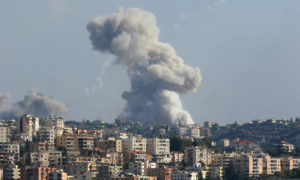Lebanon suffers heavy casualties amid Israeli airstrikes, over 490 dead

According to recent accounts, Israeli airstrikes on Hezbollah targets in Lebanon killed at least 492 individuals and wounded 1,645 others. The strikes, regarded as Lebanon’s worst day in decades, have forced tens of thousands of people to flee southern portions of the nation.
Many people are traveling north in search of safety, frequently on clogged roadways or on foot. The strikes were part of Israel’s ongoing assault against Hezbollah, which has been launching rockets at Israel in support of Hamas. Israel’s military said it attacked around 1,600 Hezbollah targets in southern Lebanon and the Bekaa Valley, including launchers and other military facilities. Israeli officials advised residents to flee areas near Hezbollah weapons depots. Meanwhile, Lebanese authorities have established temporary shelters to accommodate fleeing civilians, but the situation remains dire.
The international world, especially the United States and Saudi Arabia, has expressed concern over the escalation, fearing a bigger conflict including Iran, Israel, and other regional powers.
This violence has particularly affected southern Lebanese households. With the continual danger of airstrikes, tens of thousands of civilians have fled their homes, creating scenes reminiscent of Lebanon’s civil war. Families have packed their things into cars and trucks, causing traffic jams as they flee to Beirut and safer northern areas. Some, unable to evacuate by vehicle, have walked along coastal highways with only what they could manage.
The Lebanese government, led by Crisis Response Minister Nasser Yassin, has established temporary shelters in schools and other buildings. These shelters are supposed to take in the expanding number of displaced persons, but the capacity of such facilities—currently projected to hold roughly 26,000—are rapidly being exceeded.
The escalation in Lebanon has raised concerns that the conflict would spread to include other regional powers, such as Iran and the US. Both countries have an interest in the war, with Iran supporting Hezbollah and Hamas and the United States maintaining close connections with Israel. In response, the United States has called for calm and urged all parties to avoid further escalation, concentrating instead on diplomatic solutions.
